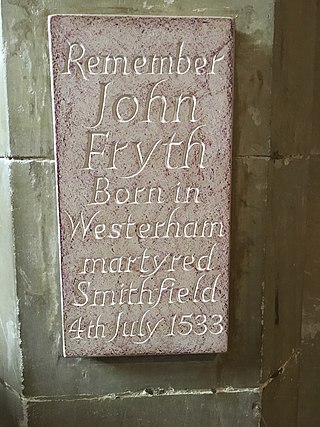
Sir Thomas More PC, venerated in the Catholic Church as Saint Thomas More, was an English lawyer, judge, social philosopher, author, statesman, and noted Renaissance humanist. He also served Henry VIII as Lord High Chancellor of England from October 1529 to May 1532. He wrote Utopia, published in 1516, which describes the political system of an imaginary island state.
William Tyndale was an English biblical scholar and linguist who became a leading figure in the Protestant Reformation in the years leading up to his execution. He is well known as a translator of the Bible into English, and was influenced by the works of prominent Protestant Reformers such as Martin Luther.

John Badby (1380–1410), one of the early Lollard martyrs, was a tailor in the west Midlands, and was condemned by the Worcester diocesan court for his denial of transubstantiation.

John Fisher was an English Catholic bishop, cardinal, and theologian. Fisher was also an academic and Chancellor of the University of Cambridge. He was canonized by Pope Pius XI.

Robert Barnes was an English reformer and martyr.
John Lambert was an English Protestant martyr burnt to death on 22 November 1538 at Smithfield, London.

John Frith was an English Protestant priest, writer, and martyr.

Rowland Taylor was an English Protestant martyr during the Marian Persecutions.

Anne Askew, married name Anne Kyme, was an English writer, poet, and Protestant preacher who was condemned as a heretic during the reign of Henry VIII of England. She and Margaret Cheyne are the only women on record known to have been both tortured in the Tower of London and burnt at the stake.
Robert Crowley, was a stationer, poet, polemicist and Protestant clergyman among Marian exiles at Frankfurt. He seems to have been a Henrician Evangelical in favour of a more reformed Protestantism than the king and the Church of England sanctioned. Under Edward VI, he joined a London network of evangelical stationers to argue for reforms, sharing a vision of his contemporaries Hugh Latimer, Thomas Lever, Thomas Beccon and others of England as a reformed Christian commonwealth. He attacked as inhibiting reform what he saw as corruption and uncharitable self-interest among the clergy and wealthy. Meanwhile, Crowley took part in making the first printed editions of Piers Plowman, the first translation of the Gospels into Welsh, and the first complete metrical psalter in English, which was also the first to include harmonised music. Towards the end of Edward's reign and later, Crowley criticised the Edwardian Reformation as compromised and saw the dissolution of the monasteries as replacing one form of corruption by another. On his return to England after the reign of Mary I, Crowley revised his chronicle to represent the Edwardian Reformation as a failure, due to figures like Thomas Seymour, 1st Baron Seymour of Sudeley, Edward Seymour, 1st Duke of Somerset and John Dudley, 1st Duke of Northumberland. Crowley's account of the Marian martyrs represented them as a cost mostly paid by commoners. The work became a source for John Foxe's account of the period in his Actes and Monuments. Crowley held church positions in the early to mid-1560s and sought change from the pulpit and within the church hierarchy. Against the Elizabethan Religious Settlement, Crowley was a leader in the renewed vestments controversy, which eventually lost him his clerical posts. During the dispute he and other London clergy produced a "first Puritan manifesto". Late in life Crowley was restored to several church posts and appears to have charted a more moderate course in defending it from Roman Catholicism and from nonconformist factions that espoused a Presbyterian church polity.

The White Horse Tavern or White Horse Inn was allegedly the meeting place in Cambridge for English Protestant reformers to discuss Lutheran ideas, from 1521 onwards. According to the historian Geoffrey Elton the group of university dons who met there were nicknamed "Little Germany" in reference to their discussions of Luther. Whilst the pub undoubtedly existed, several scholars have questioned the existence of the White Horse meetings – they are described by John Foxe in his Book of Martyrs, but no other evidence for them exists. Gergely M Juhász writes that "Foxe’s romantic image of these students and scholars convening secretly on a regular basis in the White Horse Inn… is unsubstantiated", and Alec Ryrie refers to it as "the stubborn legend of the White Horse Inn".

Thomas Harding was a sixteenth-century English religious dissident who, while waiting to be burnt at the stake as a Lollard in 1532, was struck on the head by a spectator with one of the pieces of firewood, which killed him instantly.
John Capon, aliasJohn Salcot was a Benedictine monk who became bishop of Bangor, then bishop of Salisbury under Henry VIII. He is often referred to as John Salcot alias Capon.
George Joye was a 16th-century Bible translator who produced the first printed translation of several books of the Old Testament into English (1530–1534), as well as the first English Primer (1529).

George Marsh was an English Protestant martyr who died in Boughton, Chester, on 24 April 1555 as a result of the Marian Persecutions carried out against Protestant Reformers and other dissenters during the reign of Mary I of England. His death is recorded in Foxe's Book of Martyrs.
James Bainham was an English lawyer and Protestant reformer who was burned as a heretic in 1532.

Thomas Hawkes was an English protestant martyr who burned to death in 1555 during the Marian Persecutions rather than allow his son to be baptised into the Roman Catholic Church.
John Tewkesbury was a Paternoster Row leather merchant in London and Protestant reformer, convicted of heresy and burned at the stake in West Smithfield, London, on 20 December 1531.